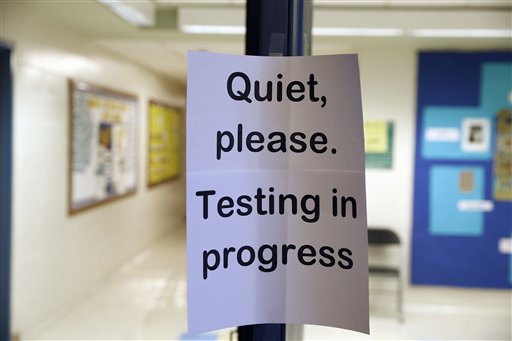
AUDIO TRANSCRIPT: Students with disabilities stand to benefit without the MCAS
WCVB Channel 5: Residents of the Commonwealth voted about 59 to 41 in favor of removing the MCAS as a graduation requirement.
Anna McCusker: After years of debate, this November Massachusetts voters decided to do away with requiring passing the MCAS, the statewide high-school test, for students to graduate.
Massachusetts is among the highest-ranked states for quality of education, but it is also one of only two states without a uniform set of required courses every student must take to graduate high school.
This means that requirements vary from school to school, and without the standardized test, some people are concerned about the lack of any statewide graduation standard.
Opponents argue that this variance will lead to inequality between each Massachusetts high school education. But there is one group that stands to benefit immediately from the loss of the assessment test — students with disabilities.
*Natural sound of kids in a school hallway*
McCusker: In elementary and middle school, Massachusetts students with disabilities can take alternate exams that prove they meet educational expectations without the standard testing.
However, this is not an option in high school, which makes passing the test for graduation a difficult task for students with disabilities.
Tara Mansour: I’m very happy that it was eliminated.
McCusker: Westwood resident Tara Mansour has been an occupational therapist in Massachusetts schools for more than 20 years. She says the pressure of passing the MCAS takes away valuable time from teaching these students other skills.
Mansour: Instead of being able to spend the time teaching them functional living skills, functional math skills, functional communication skills, the time was spent over summers and any extra-curricular option there was during the school day to train them for the exam that many times they didn’t even pass.
McCusker: Mansour says this left many students with disabilities without — not just a high school degree—but without the necessary skills to function independently after high school. She says removing the state test is the best way to help students with disabilities succeed.
Mansour: I think there’s lots of things that we can do differently, but these days it seems like you need one big yes or one big no, and I still think they did the right thing by taking it away.
McCusker: But supporters of a statewide graduation requirement are already taking action. They are planning to begin discussions about creating -not another statewide test – but a statewide set of course requirements, soon.
Those requirements could provide proof that traditional high school graduates ARE meeting certain standards – and that non-traditional students are, too. I’m Anna McCusker, NCC News.
WESTWOOD, MASS. (NCC News) — After years of debate, this November, Massachusetts voters decided to do away with requiring passing the MCAS, the statewide high-school test, for students to graduate.
Massachusetts is among the highest-ranked states for quality of education, but it is also one of only two states without a uniform set of required courses every student must take to graduate high school.
This means that requirements vary from school to school and without the standardized test some people are concerned about the lack of any statewide graduation standard. But there is one group that stands to benefit immediately from the loss of the assessment test: students with disabilities.
In elementary and middle school, Massachusetts students with disabilities can take alternate exams that prove they meet educational expectations without the standard testing. However, this is not an option in high school, which makes passing the test for graduation a difficult task for students with disabilities.
Westwood resident Tara Mansour has been an occupational therapist in Massachusetts schools for over 20 years. She says the pressure of passing the MCAS takes away valuable time from teaching these students other skills.
“Instead of being able to spend the time teaching them functional living skills, functional math skills, functional communication skills, the time was spent over summers and any extra-curricular option there was during the school day to train them for the exam that many times they didn’t even pass,” Mansour said.
According to Mansour, this left many students with disabilities without not only a high school diploma, but the necessary skills to function independently after high school. She says removing the state test is the best way to help students with disabilities succeed.
“I think there’s lots of things that we can do differently, but these days it seems like you need one big yes or one big no, and I still think they did the right thing by taking it away,” Mansour said.
But, supporters of a statewide graduation requirement are already taking action. They are planning to begin discussions about creating -not another statewide test – but a statewide set of course requirements, soon. Those requirements could prove that traditional high school graduates are meeting certain standards and that non-traditional students are too.
